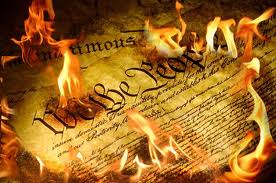A Liberal View of July 4th
< < Go Back
by John Goodman,
 There are two principal meanings of the word “liberal.” On the one hand, there is classical liberalism — the political philosophy of Thomas Jefferson, the founding fathers, Abraham Lincoln, etc., and which is reflected in the Declaration of Independence. Then there is modern liberalism, which rejects virtually all of classical liberalism, except perhaps in the civil liberties realm.
There are two principal meanings of the word “liberal.” On the one hand, there is classical liberalism — the political philosophy of Thomas Jefferson, the founding fathers, Abraham Lincoln, etc., and which is reflected in the Declaration of Independence. Then there is modern liberalism, which rejects virtually all of classical liberalism, except perhaps in the civil liberties realm.
Independence Day presents a problem for modern liberals. This is the day when we are supposed to celebrate the signing of our founding document. So what do you do if you’re an editorial writer or a columnist and you have to write something about July 4th when you don’t really believe in July 4th?
Imagine a tribute to America that:
– Says the founding fathers were hypocrites because many of them owned slaves.
– Pretends that the phrase “all men are created equal” means equality of material condition (or at least equality of opportunity) rather than its actual meaning: equality before the law.
– Spends another two paragraphs announcing that although the original colonists were mainly WASPS, “we’re no longer an Anglo-Saxon nation; we’re only around half-Protestant; and we’re increasingly nonwhite.”
– Says the most significant feature of our system is that we have survived as a “democracy,” even though the founders called it a “republic.”
Hmm…Maybe this guy should go back to grade school. Except that I’m afraid that what you just read is what kids are probably learning in school these days.
The writer of this column is New York Times columnist Paul Krugman, who provides us at this blog with a steady stream of opportunities to correct factual and logical mistakes.
Let’s take the last point first, because it’s probably the most important error here. The founders actually feared democracy. And because of that fact, the American system of government makes it very hard for the majority to impose its will on a minority. Also, the founders clearly did not believe in a “right to vote.” Seeing voting as a procedural opportunity rather than the exercise of a fundamental liberty, the colonists not only limited who could vote, they limited what people could vote for. Under the original Constitution, for example, only House members were to be popularly elected. People were to vote for electors, not presidents. Senators were to be appointed by state governments. And the Supreme Court Justices were all to be appointed, not elected.
This is not the design you would choose if you wanted government to efficiently reflect majority preferences. But the founders didn’t want efficient government. They wanted the private sector to be efficient; and to get that done, government must be held at bay.
Read More:



